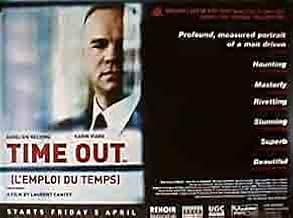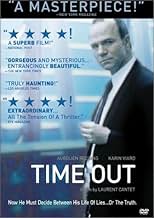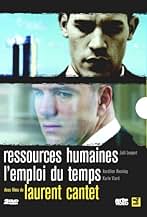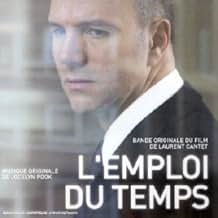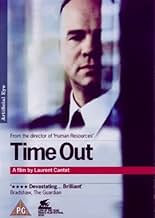CALIFICACIÓN DE IMDb
7.3/10
5.2 k
TU CALIFICACIÓN
Agrega una trama en tu idiomaAn unemployed man finds his life sinking more and more into trouble as he hides his situation from his family and friends.An unemployed man finds his life sinking more and more into trouble as he hides his situation from his family and friends.An unemployed man finds his life sinking more and more into trouble as he hides his situation from his family and friends.
- Dirección
- Guionistas
- Elenco
- Premios
- 3 premios ganados y 8 nominaciones en total
Didier Reyes
- Philippe
- (as Didier Perez)
- Dirección
- Guionistas
- Todo el elenco y el equipo
- Producción, taquilla y más en IMDbPro
Opiniones destacadas
TIME OUT (Laurent Cantet - France 2001).
The English language title Time Out is not entirely fitting. Perhaps Time Running Out would be a more appropriate title, since this is exactly what Vincent, the main character, is going through.
Vincent (Aurélien Recoing) is a highly motivated financial consultant. Or, at least, that's what he used to be. Fact of the matter is, he lost his job three months ago and now concocts an elaborate facade to cover up the fact he is now unemployed. While his wife, Muriel (Karin Viard), thinks he's at work, Vincent is aimlessly roaming the highways, hanging out at rest stops, and sleeping in his car, regularly calling his wife to give her an update about his next meeting and apologizing for coming home late, before turning in for his overnight stay in his car. Vincent lives like a ghost, increasingly detached from his wife, children and former colleagues, he doesn't seem to realize the truth is closing in. One day, they will find out. But Vincent has gotten to a point where he's constructed his own dream world. He resorts to reading all kinds of economic pamphlets about his apparent line of business, studying and memorizing them like he really is active in this line of work. As Vincent needs money, he makes up a plan to defraud old friends and his parents out of their savings by letting them in on some bogus investment scheme. He conducts his business out of a hotel lounge, where he catches the eye of Jean-Michel (Serge Livrozet, a brilliant role), a "real" , experienced operator who immediately recognizes Vincent is a fraud. He offers Vincent a job in his own operation, meaning some extra pocket money and perhaps even a way out of his increasingly sticky situation.
Director Cantet's style is distinctly unflashy. Set against the wintry landscapes of Rhône-Alpes around Grenoble and Annecy, the film makes very good use of its locations. Whether it's the bland office complexes in the "zones commerciales" at the outskirts of anonymous towns, or the snow-clad mountains surrounding them, it seems to blend perfectly with the film's tone. Accompanied by a beautiful classical score, Cantet shows himself a remarkably sharp and observant storyteller. Although the film maintains interest throughout, the running time of 132 minutes did seem a tad long, and Vincent's lengthy economic arguments when conning his friends and relatives (some of them business men themselves) out of their money weren't terribly convincing. His arguments range from unconvincing to downright nonsense. At least he would'n have convinced me, but even my 91 year old grandmother wouldn't have bought any of this for a moment. But, some of these inconsistencies aside, this is a skilfully constructed film and an engrossing psychological drama that slowly unfolds like a thriller with a brilliant performance by Aurélien Recoing to top it off.
Camera Obscura --- 8/10
The English language title Time Out is not entirely fitting. Perhaps Time Running Out would be a more appropriate title, since this is exactly what Vincent, the main character, is going through.
Vincent (Aurélien Recoing) is a highly motivated financial consultant. Or, at least, that's what he used to be. Fact of the matter is, he lost his job three months ago and now concocts an elaborate facade to cover up the fact he is now unemployed. While his wife, Muriel (Karin Viard), thinks he's at work, Vincent is aimlessly roaming the highways, hanging out at rest stops, and sleeping in his car, regularly calling his wife to give her an update about his next meeting and apologizing for coming home late, before turning in for his overnight stay in his car. Vincent lives like a ghost, increasingly detached from his wife, children and former colleagues, he doesn't seem to realize the truth is closing in. One day, they will find out. But Vincent has gotten to a point where he's constructed his own dream world. He resorts to reading all kinds of economic pamphlets about his apparent line of business, studying and memorizing them like he really is active in this line of work. As Vincent needs money, he makes up a plan to defraud old friends and his parents out of their savings by letting them in on some bogus investment scheme. He conducts his business out of a hotel lounge, where he catches the eye of Jean-Michel (Serge Livrozet, a brilliant role), a "real" , experienced operator who immediately recognizes Vincent is a fraud. He offers Vincent a job in his own operation, meaning some extra pocket money and perhaps even a way out of his increasingly sticky situation.
Director Cantet's style is distinctly unflashy. Set against the wintry landscapes of Rhône-Alpes around Grenoble and Annecy, the film makes very good use of its locations. Whether it's the bland office complexes in the "zones commerciales" at the outskirts of anonymous towns, or the snow-clad mountains surrounding them, it seems to blend perfectly with the film's tone. Accompanied by a beautiful classical score, Cantet shows himself a remarkably sharp and observant storyteller. Although the film maintains interest throughout, the running time of 132 minutes did seem a tad long, and Vincent's lengthy economic arguments when conning his friends and relatives (some of them business men themselves) out of their money weren't terribly convincing. His arguments range from unconvincing to downright nonsense. At least he would'n have convinced me, but even my 91 year old grandmother wouldn't have bought any of this for a moment. But, some of these inconsistencies aside, this is a skilfully constructed film and an engrossing psychological drama that slowly unfolds like a thriller with a brilliant performance by Aurélien Recoing to top it off.
Camera Obscura --- 8/10
Time Out is, in essence, a psychological study of a man who is in "denial" after he loses his job as a Financial Consultant and resorts to lies and deception to keep up the pretense of employment for the sake of his family. Yet it is also a searing portrait of the failure of the workplace to provide a nurturing environment for people (not a theme much explored in the Hollywood assembly line these days).
Time Out is a subtle, involving, and truly perceptive film that deals with the shallow, conformist world of middle management. It depicts how an individual's identity can be so wrapped up in what they do that they can scarcely remember who they really are and what is most meaningful in their life. As Jonathan Rosenbaum has pointed out, it is reminiscent of Melville's "Bartelby the Scrivener" in its depiction of a banal middle-aged businessman who would just prefer not to tell the truth.
Aurélien Recoing (a popular French stage actor) plays Vincent, who is so detached from reality he goes through the motions of pretending to work for the United Nations on a development mission. His "job" is conveniently based away from his wife and three children in Switzerland. Here he spends his hours driving around in his car, going in and out of hotels and conference rooms, exerting as much energy in his pretense as he would if he were actually working. I think the point is that his "pretend" job is different only in degree from his former "real" one.
Cantet uses the business world with its offices, hotels, and associates to portray an individual whose day-to-day activity consists only in constructing a false life. Vincent has to resort to obtaining money under false pretenses from his friends and his father and to assist a petty criminal in his smuggling attempts. For all his lies, Vincent confesses how suffocating his job has been. "I don't know what I'm supposed to do," he cries to his wife, under the pretense of discussing his non-existent new position.
As he stands on the outside looking in, he slowly loses touch with everything that has given his life meaning. His family, who he truly loves, also cannot provide the emotional support he needs. The impression is that the lack of emotional expression, the failure to communicate, and the skimming along on the surface of life is not new to this family. These are the same people who live next door to you, always happy and smiling who seem to have it together until a crisis comes. Then, they have no inner strength to deal with it.
Time Out is a subtle, involving, and truly perceptive film that deals with the shallow, conformist world of middle management. It depicts how an individual's identity can be so wrapped up in what they do that they can scarcely remember who they really are and what is most meaningful in their life. As Jonathan Rosenbaum has pointed out, it is reminiscent of Melville's "Bartelby the Scrivener" in its depiction of a banal middle-aged businessman who would just prefer not to tell the truth.
Aurélien Recoing (a popular French stage actor) plays Vincent, who is so detached from reality he goes through the motions of pretending to work for the United Nations on a development mission. His "job" is conveniently based away from his wife and three children in Switzerland. Here he spends his hours driving around in his car, going in and out of hotels and conference rooms, exerting as much energy in his pretense as he would if he were actually working. I think the point is that his "pretend" job is different only in degree from his former "real" one.
Cantet uses the business world with its offices, hotels, and associates to portray an individual whose day-to-day activity consists only in constructing a false life. Vincent has to resort to obtaining money under false pretenses from his friends and his father and to assist a petty criminal in his smuggling attempts. For all his lies, Vincent confesses how suffocating his job has been. "I don't know what I'm supposed to do," he cries to his wife, under the pretense of discussing his non-existent new position.
As he stands on the outside looking in, he slowly loses touch with everything that has given his life meaning. His family, who he truly loves, also cannot provide the emotional support he needs. The impression is that the lack of emotional expression, the failure to communicate, and the skimming along on the surface of life is not new to this family. These are the same people who live next door to you, always happy and smiling who seem to have it together until a crisis comes. Then, they have no inner strength to deal with it.
10jotix100
"Time Out" seems to be the wrong translation for "L'emploi du temps". Laurent Cantet, the brilliant French director has given us a film that has a hypnotic quality and makes the viewer thinks. M. Cantet also wrote the material for the movie with Robin Campillo. This is, without a doubt, one of the most satisfying films coming from France in recent memory. As he proved with his "Human Resources", M. Cantet loves to present us stories in which characters are at the crossroads of their lives facing dilemmas related to things in the work environment.
If you haven't watched the film, perhaps you should like to stop reading now.
Vincent, the main character of "Time Out", is seen at the beginning of the film driving aimlessly through rural France, stopping at rest stops to sleep, buying things at roadside shops, or just idling around. When he calls his wife Muriel in his cell phone, we hear banal conversation between a married couple where the husband is calling home to check on his family. The only trouble is that Vincent is unemployed and he is reluctant to break the news to the family.
This man has a lovely wife, three normal children. His parents seem to have a good relationship with him. We see no sight of conflict. That is why so hard to understand what makes Vincent tick. Is it shame? Is it an ego thing? Is it his pride? Nothing seems to answer our questions because for all appearances, he is a normal person.
When Vincent hints about the possibility of a job in Geneva with the UN, his father, as well as the rest of the family believes him. Vincent witnesses a meeting in the UN building about the investment opportunities in Africa and how is that body going to be instrumental in helping the emerging economies. Suddenly, Vincent makes a plan to get some of his friends part with their savings by inventing a sure plan with incredible returns. In a way, it seems that people will be reluctant of schemes such as this one, but obviously, greed play a great deal in their minds and they give money to any charlatan. I know it first hand since I have a close friend that lost a lot of money this way, even though he understood about the risks involved.
Jean Michel, the mysterious man that happens to overhear Vincent pitching the idea to prospective investors, realizes the impossibility of the scheme. Vincent tells him about his plight and Jean Michel offers him a job helping him smuggle the counterfeit merchandise that makes a lot of money.
Unfortunately for liars, discovery is only a phone call away. Muriel finds out the truth and confronts Vincent about it. She tells her father in law, who has given an obscene amount of money to Vincent. When the father arrives at the house, Vincent flees into the night to the comforting highways that have become his best friends because they don't ask anything of him. Eventually, Vincent is seen calling Muriel from a roadside. She pleads with him to come home, but he refuses. The turmoil within his soul will not let him see the end of the tunnel. In his own mind, there is no solution for the problem he created.
The director hints to an easy solution for Vincent with an imminent suicide, but no. In the last sequence that ends the picture, we watch a Vincent dressed all in black being interviewed for a job that his father has been instrumental in securing for him. Are we seeing the truth, or are we seeing what the director has brilliantly done in order to get take us to a possibility that will register as the solution in our minds. The only thing is M. Cantet has left us clues about what really becomes of Vincent.
Aurelien Recoing, is a terrific actor. As times he reminds us of Kevin Spacey, and at times, he resembles a more ethereal James Gandolfini, but make no mistake, M. Recoing is an actor who captured the essence of the troubled Vincent. As Muriel, Karin Viard, is perfect. She gives a restrained performance. Also, Serge Livrozet, the kind Jean Michel, makes a wonderful appearance.
We await for the next work by the amazing Laurent Cantet.
If you haven't watched the film, perhaps you should like to stop reading now.
Vincent, the main character of "Time Out", is seen at the beginning of the film driving aimlessly through rural France, stopping at rest stops to sleep, buying things at roadside shops, or just idling around. When he calls his wife Muriel in his cell phone, we hear banal conversation between a married couple where the husband is calling home to check on his family. The only trouble is that Vincent is unemployed and he is reluctant to break the news to the family.
This man has a lovely wife, three normal children. His parents seem to have a good relationship with him. We see no sight of conflict. That is why so hard to understand what makes Vincent tick. Is it shame? Is it an ego thing? Is it his pride? Nothing seems to answer our questions because for all appearances, he is a normal person.
When Vincent hints about the possibility of a job in Geneva with the UN, his father, as well as the rest of the family believes him. Vincent witnesses a meeting in the UN building about the investment opportunities in Africa and how is that body going to be instrumental in helping the emerging economies. Suddenly, Vincent makes a plan to get some of his friends part with their savings by inventing a sure plan with incredible returns. In a way, it seems that people will be reluctant of schemes such as this one, but obviously, greed play a great deal in their minds and they give money to any charlatan. I know it first hand since I have a close friend that lost a lot of money this way, even though he understood about the risks involved.
Jean Michel, the mysterious man that happens to overhear Vincent pitching the idea to prospective investors, realizes the impossibility of the scheme. Vincent tells him about his plight and Jean Michel offers him a job helping him smuggle the counterfeit merchandise that makes a lot of money.
Unfortunately for liars, discovery is only a phone call away. Muriel finds out the truth and confronts Vincent about it. She tells her father in law, who has given an obscene amount of money to Vincent. When the father arrives at the house, Vincent flees into the night to the comforting highways that have become his best friends because they don't ask anything of him. Eventually, Vincent is seen calling Muriel from a roadside. She pleads with him to come home, but he refuses. The turmoil within his soul will not let him see the end of the tunnel. In his own mind, there is no solution for the problem he created.
The director hints to an easy solution for Vincent with an imminent suicide, but no. In the last sequence that ends the picture, we watch a Vincent dressed all in black being interviewed for a job that his father has been instrumental in securing for him. Are we seeing the truth, or are we seeing what the director has brilliantly done in order to get take us to a possibility that will register as the solution in our minds. The only thing is M. Cantet has left us clues about what really becomes of Vincent.
Aurelien Recoing, is a terrific actor. As times he reminds us of Kevin Spacey, and at times, he resembles a more ethereal James Gandolfini, but make no mistake, M. Recoing is an actor who captured the essence of the troubled Vincent. As Muriel, Karin Viard, is perfect. She gives a restrained performance. Also, Serge Livrozet, the kind Jean Michel, makes a wonderful appearance.
We await for the next work by the amazing Laurent Cantet.
This is a purely awesome film, the best of Laurent Cantet, the movie that reavealed him, and the best role ever from Aurélien Recoing. This is inspired from actual events,a nd this very same story was remade one year later with Daniel Auteuil: L'ADVERSAIRE. Both are terrific but not sjown in the same manner. The 2002 film from Nicole Garcia was more criminal oriented. Here, you are glued, stuck to this riveting tale. You always wonder what will happen in the next scene. An outstanding drama, involving normal folks to whom happens something really terrible. Top of the top. One of the best dramas ever. Serge Livrozet, this non professional actor, gives here a jaw dropping short but unique performance. The amazing story of a man more and more prisoner of his own lies.
Ironically, I just saw this a day after viewing Abbas Kiarostami's brilliant "Close Up", a story of a man who could no longer accept the endless banalities of his life and decided to become someone else (a film director!). That man had no sense of identity about himself but he knew what he cared about and what he believed in (the power of art and cinema). That brings him one up on the hero of this story. Vincent is a man who also cannot accept the banalities of his life, but he hasn't the foggiest idea of who he is or what he really cares about. It's as if he was born out of a computer software program. He knows what he's supposed to care about: nice home, nice car, nice bank account... But his work as an investor is so deprived of any human value that he loses all sense of values. His environment; a sterile, generic, upper middle-class vacuum that could make one believe that all of France has turned into Silicon Valley with a touch of the Scandinavian, has none of the passion or warmth that one identifies with being human. He has a loving wife, but according to his 'program', he believes that he would lose her if she knew that he was no longer able to function as a cog in the machine, and provide her with the lifestyle that she has grown accustomed to.
That is the first tragedy of Vincent, because his wife really does love him. The second tragedy of Vincent, is that even though he recognizes his need for freedom, he doesn't know how to use it. He's like a man who has been released from a lifetime of imprisonment, but still hangs around the prison yard because he is unable to comprehend what might be available to him. He'd lost his job because his love for being free was more important to him than keeping his appointments, but most of his time spent in his new-found freedom is in doing the same job he'd done before: investments. The only difference now is that he likes to believe that the investments are helping developing Third World countries. He knows that there really are no investments (he keeps the money that people give him and spends it on a nifty Range Rover, among other things), but momentarily, he can feel as if he is 'somebody' to his family and friends when he tells them of this meaningful new job he (allegedly) has.
Vincent has been described by many as 'everyman', but I think of him more as 'everyman who has just stepped through the looking glass'. Instead of taking a good, hard look at himself, he somehow ended up taking a look beyond himself because he could not find a reflection. He can't even recognize how much he's patterned his children to follow the same program he did. We see him teaching his kindergarten-age son how to 'hard sell' his toys at a school fair. Later, in a fascinating scene, we see him and his family doing what most people of his class do in their free time. They go shopping in an upscale, overpriced store to buy clothing that they know they don't really need. Vincent has it all, but it fills nothing in him. His family has it all, yet they don't seem to question the fact that they rarely spend any time together.
Laurent Candet has created a beautifully somber and sober look at the price of 'success'. The film is practically drained of all color, save for blues and grays, to illustrate the life force that has been systematically drained from Vincent throughout his life. And the score, a somber cello piece, refreshingly accentuates Vincent's mind instead of his actions (like most scores do). It is like a slow-moving merry-go-round that brings on a sense of familiarity that is simultaneously comfortable and unnerving. Because what the gist of it all is: is that no one wants to spend their life on a merry-go-round. Even a comfortable one.
That is the first tragedy of Vincent, because his wife really does love him. The second tragedy of Vincent, is that even though he recognizes his need for freedom, he doesn't know how to use it. He's like a man who has been released from a lifetime of imprisonment, but still hangs around the prison yard because he is unable to comprehend what might be available to him. He'd lost his job because his love for being free was more important to him than keeping his appointments, but most of his time spent in his new-found freedom is in doing the same job he'd done before: investments. The only difference now is that he likes to believe that the investments are helping developing Third World countries. He knows that there really are no investments (he keeps the money that people give him and spends it on a nifty Range Rover, among other things), but momentarily, he can feel as if he is 'somebody' to his family and friends when he tells them of this meaningful new job he (allegedly) has.
Vincent has been described by many as 'everyman', but I think of him more as 'everyman who has just stepped through the looking glass'. Instead of taking a good, hard look at himself, he somehow ended up taking a look beyond himself because he could not find a reflection. He can't even recognize how much he's patterned his children to follow the same program he did. We see him teaching his kindergarten-age son how to 'hard sell' his toys at a school fair. Later, in a fascinating scene, we see him and his family doing what most people of his class do in their free time. They go shopping in an upscale, overpriced store to buy clothing that they know they don't really need. Vincent has it all, but it fills nothing in him. His family has it all, yet they don't seem to question the fact that they rarely spend any time together.
Laurent Candet has created a beautifully somber and sober look at the price of 'success'. The film is practically drained of all color, save for blues and grays, to illustrate the life force that has been systematically drained from Vincent throughout his life. And the score, a somber cello piece, refreshingly accentuates Vincent's mind instead of his actions (like most scores do). It is like a slow-moving merry-go-round that brings on a sense of familiarity that is simultaneously comfortable and unnerving. Because what the gist of it all is: is that no one wants to spend their life on a merry-go-round. Even a comfortable one.
¿Sabías que…?
- TriviaInspired by a true story, that of Jean-Claude Romand. In reality, Romand went on to kill, on January 9, 1993, his wife, two children and both his parents. It is the first of three films in two years inspired by the case, followed by L'adversaire (2002) and La vida de nadie (2002), of which the former is the closest to the real events. Phantom (2002) was also inspired by the same incident.
- ConexionesFeatured in The 2003 IFP Independent Spirit Awards (2003)
- Bandas sonorasL'Emploi Du Temps - Musique Originale
Composed by/ Arranged By Jocelyn Pook
Performed by 'Electra Strings' Ensemble
Cello Solo performed by Sophie Harris
Viola Solo performed by Clive Howard
Violin solo performed by Jacqueline Norrie
Phonographic Copyright (p) Jocelyn Pook / Haut et Court
Under Exclusive License To Virgin France
Published By Chester Music Ltd.
© 2001 Virgin France
Selecciones populares
Inicia sesión para calificar y agrega a la lista de videos para obtener recomendaciones personalizadas
- How long is Time Out?Con tecnología de Alexa
Detalles
Taquilla
- Total en EE. UU. y Canadá
- USD 448,542
- Total a nivel mundial
- USD 1,213,913
- Tiempo de ejecución
- 2h 14min(134 min)
- Color
- Mezcla de sonido
- Relación de aspecto
- 1.85 : 1
Contribuir a esta página
Sugiere una edición o agrega el contenido que falta




